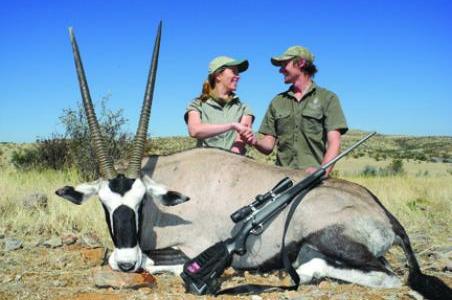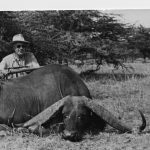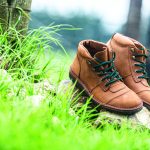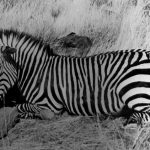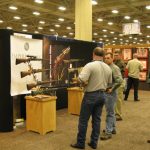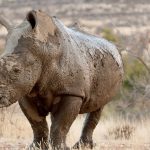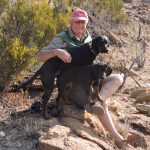An excerpt from the new book Ask the Namibian Guides.
In the new book Ask the Namibian Guides, author Diana Rupp interviews thirteen highly regarded professional hunters from all over Namibia in an effort to bring the most up-to-date information to the aspiring safari hunter. The professionals answer questions about why this country is such a popular safari destination, what hunters can expect when they go there, what to bring, how to prepare, what game to pursue, and what a typical Namibia hunt is like. In this excerpt, the PHs share their insights on how to practice and prepare for a successful safari.
How do you recommend hunters prepare for a safari? Any tips for shooting practice, etc.?
Janneman Brand: Make sure you are fit for walking, and wear well-broken-in boots. Most hunts are done on foot. Make sure you are comfortable with your rifle and are familiar with its performance.
Dirk de Bod: Shoot your gun often from shooting sticks and from field positions to get good with it and learn the ballistics.
Kai-Uwe Denker: Three months before the onset of the safari, a client should begin practicing by walking at least ten miles twice a week and do short runs of 100 yards and a few push-ups. He should practice offhand shots at 100 yards once a week.
Peter Kibble: You should be completely familiar with your rifle and practice shooting with shooting sticks if you can, as this is the way most shots are taken on safari. If you are not familiar with the technique for shooting off shooting sticks, we can show you how to do it when you arrive.
Johan Kotzé: Familiarize yourself with the various species of African animals through books and videos. Do a lot of shooting so you can get to know your rifle. It’s better to spend a little extra money on bullets for practicing at home, than on wounded game in Africa (most safari outfitters have a policy that you pay for any game that is wounded).
Corne Kruger: Hunting is like any other sport: The more you practice, the luckier you get! Most hunters do not take this seriously, and then they pay the price when they are on safari. So most important: Practice. I always recommend that hunters do most of their shooting practice with small calibers, because firing thirty shots from a bench with a .375 or another big gun will do nothing but teach you bad habits. Take a .22- or .17-caliber rifle and practice in different situations and from different shooting positions. Shooting from sticks is very important. I suggest buying three long sticks from a hardware store and tying them together about three inches from the top. These make great shooting sticks for practicing.
Joof Lamprecht: Shoot three-shot groups at a paper target at 100 yards on a regular basis. Date each target and see if you notice any improvement after a while. You can do some limited shooting off shooting sticks, but don’t do too much as you won’t like your grouping much. It makes no sense to go to the range once and shoot hundreds of rounds at cans and bottles.
Willem Mans: Get as fit as possible for long hikes. Make sure your rifle will shoot a 2-inch group and is sighted-in around 2 inches high at 100 yards.
Diethelm Metzger: One should be mentally prepared for going to a different country, a different continent, filled with different people, different cultures, and different food. Make sure that your mindset is right to cope with this situation. Be prepared to have fun.
Also, go to the shooting range as often a possible to prepare well. Develop some physical fitness by walking every day. And make sure to get all paperwork in order well before the safari; i.e., passport or visas if necessary.
Peter Thormahlen: Make sure your boots are well-worn and broken-in. Shoot your gun a lot, over a period of time. If possible, practice from shooting sticks, which you are going to use to hunt from in Africa. Then pack according to our approved safari packing list.
Jamy Traut: Read as much as you can about the country, the species you are hunting, and the outfitter. Talk to hunters who have been on similar safaris in other places and at your destination. Look at worst-case scenarios, and mentally prepare yourself for those as well. Shoot often, from different positions, and not only from comfortable ones. Practice offhand at 20 to 50 yards and use shooting sticks as well, as all PHs use them. Make sure your rifle feeds well, consistently.
Gerrit Utz: At least a month before your safari, start making a daily habit of walking a mile, just to improve your physical condition a bit. Take your spouse with you and make it an outing. It makes a big difference once you are on safari.
Go to the shooting range as much as possible and practice with your chosen rifle. Also, practice shooting with a set of shooting sticks. Get to the point where you are comfortable with them and you know the right height to set the sticks so you can fire a good shot.
John Wamback: Practice your shooting from as many positions as possible, not just from the bench. Shoot from shooting sticks, prone, sitting, and on one knee. Another drill I recommend is to run a hundred yards, and then shoot from each of these positions.
Ask the Namibian Guides is available from Safari Press: 800/451-4788; www.safaripress.com.

